
Careers News
- Details
The Solicitors in Local Government group has agreed a historic partnership protocol with charity LawWorks which will see the two organisations work together to promote pro bono work throughout local government.
The SLG said it was interested in developing appropriate pro bono opportunities for its membership. In particular, it is looking for pro bono opportunities which:
- Do not create conflicts of interest
- Do not require any commitment that any particular case or opportunity should be accepted
- Require expertise in appropriate areas of law.
Under the agreement, SLG committed to facilitating communication between LawWorks and the SLG National Executive and in particular its regional branches. It also agreed to promote LawWorks and pro bono work, circulate specific cases or opportunities, and endorse the joint protocol for pro bono work.
For its part, LawWorks said it was keen to work with SLG “in maximising the potential of the regional profile of the SLG membership”. It agreed to provide appropriate opportunities for SLG members and recognise their contributions.
The joint protocol for pro bono legal work agreed by the two organisations sets out the core values of such work and is intended to help those lawyers who get involved.
The document addresses issues such as how the work should be done, relationships between pro bono organisations and lawyers, the contribution of people who are not fully qualified or otherwise unable to do pro bono legal work, and the importance of pro bono legal work as a characteristic of being a member of the legal profession.
SLG chair Guy Goodman said: "SLG is very keen to promote pro bono work as it is something that traditionally local government solicitors have not participated in - and there is no good reason for them not to do so. LawWorks provides a wonderful opportunity for local government practitioners to make a contribution - large or small. Give it a go and see."
Writing on this site before Christmas, LawWorks chief executive Rebecca Hilsenrath said local government lawyers have “an immensely important role to play in pro bono” and highlighted some of the ways in which they can contribute.
- Details
The Judicial Appointments Commission has combined with the Law Society to launch a new training and education package that is designed to boost diversity and encourage more solicitors to become judges.
The package, also prepared with the assistance of the Black Solicitors Network, includes a video with a role-playing exercise. Such exercises – where the candidate has to play the part of a judge in a simulated case – form an important part in selection to judicial positions.
“Solicitors who do not spend much of their working lives in a courtroom or tribunal have said they would like more help to prepare for the role-playing exercise,” the Law Society said.
The package of measures also include outreach training, with solicitor-judges sharing their experiences, and judicial appointments training across England and Wales.
Chancery Lane has also set up a mentoring group of solicitor judges to help encourage solicitors to apply for appointments.
Law Society President Bob Heslett said: “The Law Society is committed to a solicitor’s profession that reflects the society it serves. Such an approach should apply to the judiciary.
“Many solicitors still feel disadvantaged in the judicial appointments process. There are misconceptions which the Law Society hopes to debunk with this package, including those surrounding the type of references required or the right professional, educational or even social background.”
- Details
Having a clear idea of where your career is heading is vital if you are to achieve your ambitions. The recruitment team at Badenoch & Clark consider how local government lawyers and other professionals can put together a robust career development plan.
Some 60% of people in professional roles have told us that they would consider moving jobs for career progression. Making that move the right one requires careful consideration.
Is this next move a stepping stone to even bigger and better things? What skills do you need to hone to make your next-but-one move? What are employers looking for and how do you match up?
No matter what the economic climate, if you’re ambitious, you’ll need to have a good idea of the routes you may take and how to make the journey easier. This guide highlights the main things you’ll need to consider when developing your career plan.
See your career as a journey
Having a clear idea of where you want to get to is the best start. It’s this vision that will keep you energised in the good times and focused in the down times. It’s your clarity of purpose that will make the difference between getting to where you want to be or ending up blown off course and somewhere else. It is most likely that you’ll need more than one employer to get there so work out some milestones – they might be skills-based, salary-based, responsibility-based. One thing for certain is they really shouldn’t be job titles.
Your career is something you build continuously rather than an endless string of jobs you move onto. It’s about increasing your knowledge and building up the right skills and experiences that are valued by employers. Keep an open mind on the precise route you take to get to where you want to be – there’s almost certainly more than one way to get there. If you are focused on your end goal, you’ll pick up development opportunities as you go. The more you add to your skills and experience along the way, the more routes you’ll open to get there.
Identify what motivates you
There are plenty of reasons why we fall out of love with our jobs, from outgrowing the role and wanting a greater challenge to craving new experiences or a different leadership style. And while most things can be addressed with the support of your manager, work feels less like work the more you enjoy it. In deciding where you want to be, make sure it’s somewhere that will hold your interest long-term, suits your preferred lifestyle and uses your skills to the fullest.
The things we are good at are often the things we enjoy most. This is a good place to start, especially as personal development will ensure you don’t limit your ambitions. What do you like about your existing role? What topics do you get passionate about? What projects get you excited? By courting the sectors, specialisms and cultures you’re most likely to thrive in, the more likely you are to develop a genuine, unwavering and continued commitment to your career path and become a rising star.
Identify which competencies are needed to progress
Once you’ve established what interests and motivates you, the next step is to ensure your skills and competencies match your chosen career path. You will need to fully identify (and understand) what competencies are required in order for you to move onto the next level, and furthermore, succeed at that level.
Does your ultimate role need analytical reasoning, commercial awareness, or does it rely more on strong communication skills and leadership qualities?
Some of these you may already be very strong at, however, where you’re not, now is the time to start focusing on improving these areas. Get an objective opinion by asking your manager how you rate at these competencies, and how you can improve on them in the future. The more you begin to recognise where your strengths lie competency-wise, and where you need to improve, the more attainable that career path becomes.
Are qualifications or experience more valuable?
Some roles do require specific qualifications, but whilst employers are attracted to well-qualified business people, they are even more attracted to those who demonstrate a commitment to being experts in their field. For many professionals, the qualification is the starting block, the rite of passage. It gets you through the door. Alone, the letters after your name will not be enough to guarantee your future career. It’s your hands-on experience and exposure to specific types of work that builds your career prospects. Being skilful in what you do and having a demonstrable track record is the most important quality.
Did it happen for them?
At interview, employers will be selling their credentials to you just as much as you to them. Promises are easily made, but you’ll want them to be rooted in reality. So be sure to ask for real life examples of where and how they’ve supported their employees to reach different career milestones.
Firstly, is there a culture of organic growth? What different career paths have been made possible? Ask for examples of individuals who have progressed up and across the organisation. This will give you a measure of long-term feasibility.
Next, what career development opportunities were given to the previous incumbent, and what path did they travel? Where were personal development, secondments or training given? At what pace did they progress? This will tell you what to expect for yourself.
Compare everything you’ve learnt about your prospective employer’s commitment to providing compelling career paths, with your own career goals. If these don’t tally, you may need to adjust your expectations or seek out an alternative employer. If it’s good news, you’ll want to agree a development plan with your new boss in due course.
Put your plan in context of the market
While you may already have mapped out in detail your career path, market conditions will always play a hand in how quickly and to what extent you can achieve your plan. While a clear focus and drive is essential, you need to be realistic and put your aspirations into the context of the current market.
Career openings and opportunities are naturally limited in a downturn, likewise, the skills and competencies that employers demand may also adapt – what is in demand in a buoyant economy is often at the bottom of the list in a downturn. Bear in mind that market conditions are constantly changing, and consequently your expectations may need to fluctuate with the times. If you can remain flexible and open- minded, then your chances of fulfilling your longer-term plans are more likely to come to fruition.
Consider all your options
Continuously scan your environment for development opportunities. Keeping your end goal in mind makes it easier to spot exciting opportunities that come your way both inside and outside of your organisation. Knowing your options prevents you feeling trapped in a particular role and helps you to stay positive and focussed. There’s plenty to keep a look out for too – special projects, mentoring, coaching, having a great role model, work shadowing, technical training, soft skills training, secondments, conferences, seminars and networking events. Exhaust all these options before you consider a career move.
Know what your employer wants to see first
In order for you to progress along your chosen career path, you need to be aware of what it’s going to take to get there. Part of achieving your objectives and long-term plans will come from understanding your employer’s expectations of you.
If you want to get ahead, it helps to have the support of your manager so that they can give you the tools to get there. They may have concerns or areas for improvement that you have not considered yet. There may also be other wider corporate or department issues that you are not aware of which could get in the way of your progression. Talk to them about your aspirations and plans, so that they can give you a fair assessment on what you need to do in order to achieve them – and what opportunities may be on offer either now or in the future. The more honest feedback you can receive, as well as advice and guidance, the more likely you are to succeed on your path.
Review your plans and chart your progress
Do make sure that the goals you set and the milestones you noted at the beginning are not forgotten. Write them down somewhere and refer to them frequently. No performance review, appraisal or career conversation should go by without direct reference to your career plan. By being aware of where you are going and the timescales you set yourself, you’ll know whether you’re making the appropriate progress.
And remember that there’s more than one route to get to where you’re going. Take stock to see if you’ve changed direction and reset your course accordingly. This way, you’ll take advantage of the development opportunities that come along and be able to direct the conversations you have with your boss to plan for an immediate future that achieves both of your objectives.
This article was written by the team at Badenoch & Clark.
- Details
The Solicitors in Local Government group is calling for nominations for its 2010 Young Solicitor of the Year award.
Nominations can be made for individuals working in local government with up to ten years’ post qualification experience. The criteria on which the judges make their decision are that the individual must fulfil one or more of the following:
- Be innovative.
- Be making or having a material impact on their local authority’s performance.
- Be an exemplar of best practice.
- Promote the best interests, and help raise the profile of, local government lawyers.
This is the fifth year of the award, which is sponsored by Trowers & Hamlins. Last year’s award was won by Nathalie Birkett, a solicitor at Nottinghamshire County Council.
Birkett won for her work across Adult Social Care and Health and the planning committee. This included drafting a partnership and framework agreement for procuring housing providers for the NHS as well as helping resolve contentious planning decisions regarding an energy recovery facility. Birkett also represents young solicitors on the SLG national executive.
Individual solicitors can nominate themselves, while managers, client officers, members or anyone who recognise the contribution an individual has made can also put a person’s name forward.
The nomination requires details of the nominee and their contribution, together with one letter of support from another person who has knowledge of the nominee’s work.
For more information, go to: http://www.slgov.org.uk/news/young_solicitor
The closing date for submissions is 19 March 2010. A presentation ceremony will be held at the black tie dinner at the SLG’s Weekend School in York in April.
Page 88 of 88
Senior Lawyer - Advocate
Director of Legal and Governance (Monitoring Officer)
Assistant Director - Legal & Governance
Head of Governance & University Solicitor
Events

 Back to Basics: Construction Insurance and Insolvency - Devonshires
Back to Basics: Construction Insurance and Insolvency - Devonshires
16-07-2025 2:00 pm
Online (live)
 Institutional landlord series: Service and Notices – from Possessions to Injunctions and Requests for Access - 5 Pump Court
Institutional landlord series: Service and Notices – from Possessions to Injunctions and Requests for Access - 5 Pump Court
16-07-2025 4:00 pm
Online (live)
 HMPL Building Blocks: Tackling Non-occupation and Sub-letting - Devonshires
HMPL Building Blocks: Tackling Non-occupation and Sub-letting - Devonshires
17-07-2025
Online (live)
 To establishing whether Material Changes of Use have occurred - Ivy Legal Training
To establishing whether Material Changes of Use have occurred - Ivy Legal Training
18-07-2025 9:30 am
Online (live)
 Business and Property Masterclass #5: Interim Relief – Acting urgently and getting it right - Cornerstone Barristers
Business and Property Masterclass #5: Interim Relief – Acting urgently and getting it right - Cornerstone Barristers
10-09-2025 11:00 am
Online (live)
 Business and Property Masterclass #6: Rights of Light and Restrictive Covenants - Cornerstone Barristers
Business and Property Masterclass #6: Rights of Light and Restrictive Covenants - Cornerstone Barristers
23-09-2025
Online (live)
 HMPL Building Blocks: Service Charges & Ground Rent – Tackling Leasehold and Shared Ownership Arrears - Devonshires
HMPL Building Blocks: Service Charges & Ground Rent – Tackling Leasehold and Shared Ownership Arrears - Devonshires
14-10-2025
Online (live)
 Institutional landlord series: Possession – High Court Enforcement - 5 Pump Court
Institutional landlord series: Possession – High Court Enforcement - 5 Pump Court
22-10-2025 4:00 pm
Online (live)
 Institutional landlord series: Costs Recovery and Legally Aided Parties - 5 Pump Court
Institutional landlord series: Costs Recovery and Legally Aided Parties - 5 Pump Court
05-11-2025 4:00 pm
Online (live)
 HMPL Building Blocks: Law and Procedure Following Death of a Tenant - Devonshires
HMPL Building Blocks: Law and Procedure Following Death of a Tenant - Devonshires
09-12-2025
Online (live)
 HMPL Building Blocks: Legal Tools to Combat Anti-Social Behaviour - Devonshires
HMPL Building Blocks: Legal Tools to Combat Anti-Social Behaviour - Devonshires
17-02-2026
Online (live)







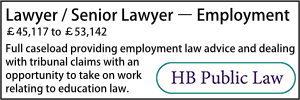

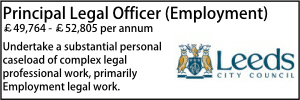
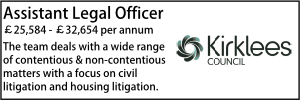
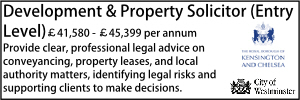




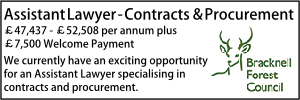





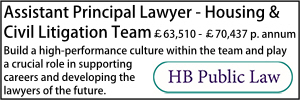









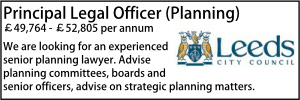







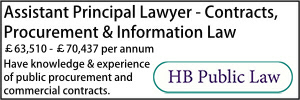








 A-Z Family Law: Take Two! - 42 Bedford Row
A-Z Family Law: Take Two! - 42 Bedford Row  Executive Programme in Public Procurement Law and Policy - University of Nottingham
Executive Programme in Public Procurement Law and Policy - University of Nottingham  Property Law Roadshow 2025 - Bristol - St John's Chambers
Property Law Roadshow 2025 - Bristol - St John's Chambers  CUBAS Comprehensive Training & Licencing (Manchester), September 2025
CUBAS Comprehensive Training & Licencing (Manchester), September 2025  AI in the Public Sector Conference - Westminster Insight
AI in the Public Sector Conference - Westminster Insight  Activism in the Workplace - 42BR Barristers Employment Law Annual Lecture
Activism in the Workplace - 42BR Barristers Employment Law Annual Lecture  DoLS Authoriser Training - LPS Law
DoLS Authoriser Training - LPS Law  Property Law Roadshow 2025 - Cardiff - St John's Chambers
Property Law Roadshow 2025 - Cardiff - St John's Chambers  Annual Fraud Conference 2025 - Oxford Investigation Service
Annual Fraud Conference 2025 - Oxford Investigation Service